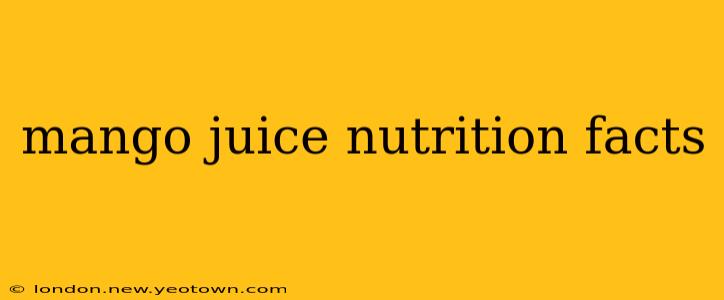Ah, mango juice! That vibrant, sunny hue and sweet, tropical flavor instantly transport you to a warm beach. But beyond its delicious taste, mango juice offers a surprising array of nutritional benefits. Let's dive into the juicy details of what makes this popular beverage a healthy addition to your diet.
What are the nutritional benefits of mango juice?
Mango juice is a powerhouse of vitamins and minerals. A single serving is typically brimming with Vitamin C, a potent antioxidant that boosts your immune system and protects your cells from damage. It's also a good source of Vitamin A, crucial for healthy vision and skin, and Vitamin B6, important for brain development and function. Furthermore, mangoes, and therefore their juice, contain various antioxidants that fight free radicals, reducing the risk of chronic diseases. The potassium content helps regulate blood pressure, and the fiber contributes to digestive health.
Is mango juice good for weight loss?
This is a common question, and the answer is nuanced. While mango juice does contain some beneficial nutrients, it's also relatively high in natural sugars. Consuming too much sugar, even natural sugars, can hinder weight loss efforts. Moderation is key. Opting for 100% juice without added sugars and incorporating it as part of a balanced diet and exercise plan is more likely to support your weight loss goals than relying on it as a standalone solution.
How many calories are in mango juice?
The calorie count in mango juice varies depending on the brand, serving size, and whether added sugars are present. Generally, a single serving (around 8 ounces) can contain anywhere from 100 to 150 calories. Always check the nutrition label on the specific product you are consuming for accurate information. Be aware that some commercially produced mango juices may contain added sugars, significantly increasing the calorie and sugar content.
Is mango juice good for your skin?
Yes! The high Vitamin C and Vitamin A content in mango juice contributes to healthy skin. Vitamin C is essential for collagen production, which gives your skin its structure and firmness. Vitamin A is a powerful antioxidant that protects your skin from damage caused by sun exposure and pollution, contributing to a youthful and radiant complexion.
What are the potential drawbacks of drinking mango juice?
While mango juice offers numerous health benefits, it's important to be mindful of potential drawbacks. Its high sugar content can contribute to weight gain if consumed excessively. It can also exacerbate existing digestive issues in some individuals due to its acidity. People with diabetes should consume mango juice in moderation and monitor their blood sugar levels carefully. Also, be wary of commercially produced juices which may contain added sugars, preservatives and artificial coloring.
Can I make my own mango juice at home?
Absolutely! Making your own mango juice at home allows you to control the ingredients and sugar content. Simply blend ripe mangoes with a little water (adjust to your desired consistency) and strain if you prefer a smoother texture. This eliminates added sugars and preservatives, providing a healthier and more flavorful option.
Is mango juice better than mango?
This depends on your goals and preferences. Whole mangoes offer more fiber, which aids digestion, and a slightly lower sugar content compared to juice, even 100% juice. However, mango juice can be a convenient way to incorporate mangoes into your diet, particularly for those who find it difficult to eat whole fruit regularly. Ideally, a balanced approach, including both whole mangoes and mango juice in moderation, would be best.
In conclusion, mango juice can be a delightful and nutritious part of a balanced diet. However, moderation is key, and awareness of its sugar content and potential drawbacks is crucial. Enjoy this tropical treat responsibly and reap its many health benefits.

